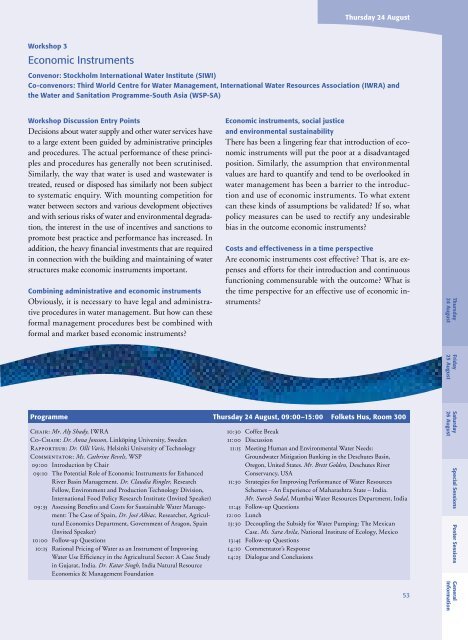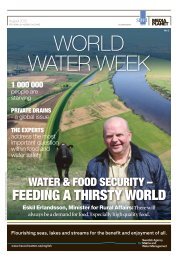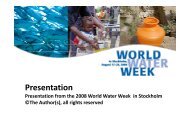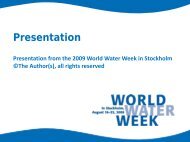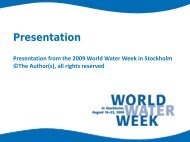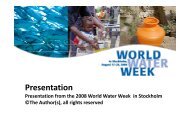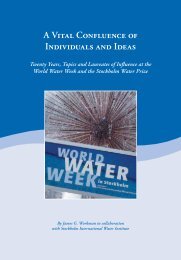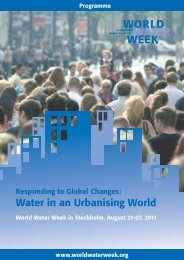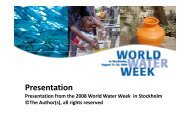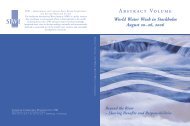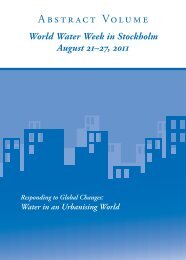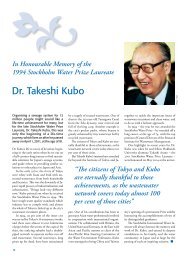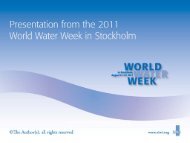Final Programme Beyond the River - World Water Week
Final Programme Beyond the River - World Water Week
Final Programme Beyond the River - World Water Week
Create successful ePaper yourself
Turn your PDF publications into a flip-book with our unique Google optimized e-Paper software.
Thursday 24 August<br />
Workshop 3<br />
Economic Instruments<br />
Convenor: Stockholm International <strong>Water</strong> Institute (SIWI)<br />
Co-convenors: Third <strong>World</strong> Centre for <strong>Water</strong> Management, International <strong>Water</strong> Resources Association (IWRA) and<br />
<strong>the</strong> <strong>Water</strong> and Sanitation <strong>Programme</strong>-South Asia (WSP-SA)<br />
Workshop Discussion Entry Points<br />
Decisions about water supply and o<strong>the</strong>r water services have<br />
to a large extent been guided by administrative principles<br />
and procedures. The actual performance of <strong>the</strong>se principles<br />
and procedures has generally not been scrutinised.<br />
Similarly, <strong>the</strong> way that water is used and wastewater is<br />
treated, reused or disposed has similarly not been subject<br />
to systematic enquiry. With mounting competition for<br />
water between sectors and various development objectives<br />
and with serious risks of water and environmental degradation,<br />
<strong>the</strong> interest in <strong>the</strong> use of incentives and sanctions to<br />
promote best practice and performance has increased. In<br />
addition, <strong>the</strong> heavy financial investments that are required<br />
in connection with <strong>the</strong> building and maintaining of water<br />
structures make economic instruments important.<br />
Combining administrative and economic instruments<br />
Obviously, it is necessary to have legal and administrative<br />
procedures in water management. But how can <strong>the</strong>se<br />
formal management procedures best be combined with<br />
formal and market based economic instruments?<br />
Economic instruments, social justice<br />
and environmental sustainability<br />
There has been a lingering fear that introduction of economic<br />
instruments will put <strong>the</strong> poor at a disadvantaged<br />
position. Similarly, <strong>the</strong> assumption that environmental<br />
values are hard to quantify and tend to be overlooked in<br />
water management has been a barrier to <strong>the</strong> introduction<br />
and use of economic instruments. To what extent<br />
can <strong>the</strong>se kinds of assumptions be validated? If so, what<br />
policy measures can be used to rectify any undesirable<br />
bias in <strong>the</strong> outcome economic instruments?<br />
Costs and effectiveness in a time perspective<br />
Are economic instruments cost effective? That is, are expenses<br />
and efforts for <strong>the</strong>ir introduction and continuous<br />
functioning commensurable with <strong>the</strong> outcome? What is<br />
<strong>the</strong> time perspective for an effective use of economic instruments?<br />
Wednesday<br />
August 23<br />
Thursday<br />
24 August<br />
Friday<br />
25 August<br />
<strong>Programme</strong> Thursday 24 August, 09:00–15:00 Folkets Hus, Room 300<br />
Chair: Mr. Aly Shady, IWRA<br />
Co-Chair: Dr. Anna Jonsson, Linköping University, Sweden<br />
Rapporteur: Dr. Olli Varis, Helsinki University of Technology<br />
Commentator: Ms. Cathrine Revels, WSP<br />
09:00 Introduction by Chair<br />
09:10 The Potential Role of Economic Instruments for Enhanced<br />
<strong>River</strong> Basin Management. Dr. Claudia Ringler, Research<br />
Fellow, Environment and Production Technology Division,<br />
International Food Policy Research Institute (Invited Speaker)<br />
09:35 Assessing Benefits and Costs for Sustainable <strong>Water</strong> Management:<br />
The Case of Spain, Dr. José Albiac, Researcher, Agricultural<br />
Economics Department, Government of Aragon, Spain<br />
(Invited Speaker)<br />
10:00 Follow-up Questions<br />
10:15 Rational Pricing of <strong>Water</strong> as an Instrument of Improving<br />
<strong>Water</strong> Use Efficiency in <strong>the</strong> Agricultural Sector: A Case Study<br />
in Gujarat, India. Dr. Katar Singh, India Natural Resource<br />
Economics & Management Foundation<br />
10:30 Coffee Break<br />
11:00 Discussion<br />
11:15 Meeting Human and Environmental <strong>Water</strong> Needs:<br />
Groundwater Mitigation Banking in <strong>the</strong> Deschutes Basin,<br />
Oregon, United States. Mr. Brett Golden, Deschutes <strong>River</strong><br />
Conservancy, USA<br />
11:30 Strategies for Improving Performance of <strong>Water</strong> Resources<br />
Schemes – An Experience of Maharashtra State – India.<br />
Mr. Suresh Sodal, Mumbai <strong>Water</strong> Resources Department, India<br />
11:45 Follow-up Questions<br />
12:00 Lunch<br />
13:30 Decoupling <strong>the</strong> Subsidy for <strong>Water</strong> Pumping: The Mexican<br />
Case. Ms. Sara Avila, National Institute of Ecology, Mexico<br />
13:45 Follow-up Questions<br />
14:10 Commentator’s Response<br />
14:25 Dialogue and Conclusions<br />
53<br />
Saturday<br />
26 August<br />
Special Sessions Poster Sessions General<br />
Information


